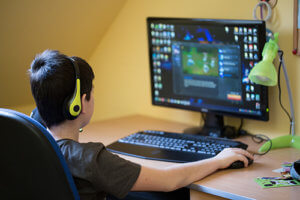We live in a technology-centered world with easy access to unlimited gadgets. Additionally, the Internet is easily accessible in most homes and other locations. These technology-based changes over recent decades have led to disturbing trends in many areas. Gaming addiction has increased dramatically over recent years, especially among young boys and teens. In fact, the World Health Organization has taken steps to recognizing gaming disorder as a legitimate mental health disorder. This could happen as soon as 2018.
How do experts define gaming addiction, and what are some of the signs? Why is professional help important for healing? We will explore these questions below in more detail.
What Is a Gaming Addiction?
 As a general rule, addiction describes a pattern of behaviour that fits two important criteria:
As a general rule, addiction describes a pattern of behaviour that fits two important criteria:
- If individuals experiencing addiction require more of something in order to continue
- If individuals don’t get more of the item in question, they experience withdrawal
While these important criteria usually reference substance abuse, this type of addiction can apply to many other activities such as gambling, sexual behaviour, and electronic gaming.
Signs of a Gaming Addiction
Since gaming addiction has become more common, it’s vital that parents remain aware of the warning signs.
Irritability or Restlessness
When individuals don’t have access to gaming, such as while they’re at work or school, they may become restless or extremely irritable. They may also have trouble focusing on tasks at hand.
Preoccupation with Gaming
Individuals with a gaming addiction will spend the majority of their time playing or planning their next gaming session. At the risk of other activities or relationships, gaming is the primary focus.
Withdrawal from Family, Friends, and Other Activities
Those with a gaming addiction may begin to isolate themselves. Even when they’re not actively playing, they may spend time alone reading about new gaming techniques. Pay attention to a loss of interest in other activities.
Hiding or Lying About How Much They Play
Some teens may attempt to hide how much time they spend playing. They may stay up late or wake up early to play in secret. Additionally, gamers can sometimes spend an enormous amount of money on this activity. Pay attention to financial difficulties and missing money.
Failing to Meet Important Obligations
Those suffering from an addiction to electronic games may begin to perform poorly at school. They often fail to meet basic responsibilities such as chores or homework. In some cases, personal hygiene may also begin to suffer.
Why Is Seeking Professional Assistance Vital to Recovery?
Addiction of any type is a complex and multi-faceted problem. Since each person handles this issue differently, in-depth behaviour treatment and education on the topic are essential.
Behavioural treatment facilities employ qualified staff members who have extensive training in dealing with addictive and self-destructive actions. Therefore, they can get to the true cause of the problem and provide lasting help that boosts recovery. They also recognize that a support system is essential to continued success. These facilities provide access to quality after-care programs to ensure that individuals have ongoing post-treatment support.
More About Venture Academy
Venture Academy is a residential behavioural treatment facility with several locations throughout Canada. We specialize in helping troubled teens to make positive changes to their thoughts and behaviours through treatment and education. Whether the troubling behaviour includes substance abuse, academic problems, electronic addiction, or self-destructive behaviours, Venture Academy can restore peace to your family using an effective, multidisciplinary approach.
You don’t have to let addiction or behavioural problems control your family’s happiness. You can overcome these issues with Venture Academy’s help. Contact our admissions department today at 866.762.2211DM_DirectNumber format=period orig=(855) 281-5813** to learn more about our troubled teen programs.
